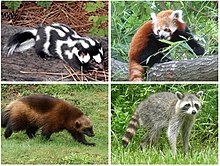Musteloidea
| Musteloidea Temporal range: Oligocene to present
| |
|---|---|

| |
| Scientific classification | |
| Domain: | Eukaryota |
| Kingdom: | Animalia |
| Phylum: | Chordata |
| Class: | Mammalia |
| Order: | Carnivora |
| Infraorder: | Arctoidea |
| Superfamily: | Musteloidea Fischer, 1817 |
| Families | |
| |
Musteloidea is a superfamily of carnivoran mammals united by shared characters of the skull and teeth. Musteloids share a common ancestor with the pinnipeds, the group which includes seals.[1]
The Musteloidea consists of the families Ailuridae (red pandas), Mustelidae (mustelids: weasels, otters, martens, and badgers), Procyonidae (procyonids: raccoons, coatis, kinkajous, olingos, olinguitos, ringtails and cacomistles), and Mephitidae (skunks and stink badgers).
In North America, ursoids and musteloids first appear in the Chadronian[citation needed] (late Eocene). In Europe, ursoids and musteloids first appear in the early Oligocene immediately following the Grande Coupure.
The cladogram is based on molecular phylogeny of six genes in Flynn (2005),[2] with the musteloids updated following the multigene analysis of Law et al. (2018).[3]
| Caniformia |
| ||||||||||||||||||||||||||||||||||||
References
- ^ Welsey-Hunt, G.D. & Flynn, J.J. (2005). "Phylogeny of the Carnivora: basal relationships among the Carnivoramorphans, and assessment of the position of 'Miacoidea' relative to Carnivora". Journal of Systematic Palaeontology. 3 (1): 1–28. doi:10.1017/S1477201904001518.
- ^ Flynn, J. J.; Finarelli, J. A.; Zehr, S.; Hsu, J.; Nedbal, M. A. (2005). "Molecular phylogeny of the Carnivora (Mammalia): Assessing the impact of increased sampling on resolving enigmatic relationships". Systematic Biology. 54 (2): 317–37. doi:10.1080/10635150590923326. PMID 16012099.
- ^ Law, Chris J.; Slater, Graham J.; Mehta, Rita S. (2018-01-01). "Lineage Diversity and Size Disparity in Musteloidea: Testing Patterns of Adaptive Radiation Using Molecular and Fossil-Based Methods". Systematic Biology. 67 (1): 127–144. doi:10.1093/sysbio/syx047. ISSN 1063-5157. PMID 28472434.
